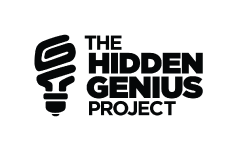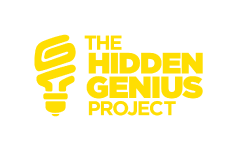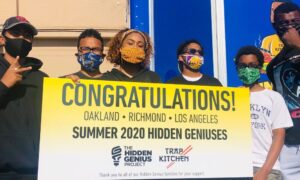By: Voyage LA
Date: Wednesday, August 19, 2020
Today we’d like to introduce you to Kayla Mason of The Hidden Genius Project.
Kayla, let’s start with your story. We’d love to hear how you got started and how the journey has been so far.
First, I’m a South Central native who grew up in two houses on 81st and Vermont, and 115th and Figueroa St. There were so many false narratives about young people in my neighborhood that I decided at 14 years old, I wanted to do something about it. I joined the Los Angeles Community Coalition as a member of SCYEA (South Central Youth Empower through Action) and learned how to improve the conditions of South Los Angeles schools. Black and Latinx youth were being pushed toward vocational trades with limited college preparatory classes. After being a part of the A-G campaign victory in LA, which resulted in thousands of students receiving college access, I was committed to challenge social systems at the local, state, and national level. That path led me to spend the next several years in education reform.
My work has been incredible over the years and I contribute a lot of it to my experience in Detroit. I applied to the #1 school in social work, which happened to be in Michigan, and was awarded a tuition scholarship. My experience at the University of Michigan, with a field placement in Detroit, helped me understand youth of color were struggling with racial issues across the country. In Detroit, I helped high school students secure federal funding in the amount of $1.5million to adopt Chicago’s violence prevention model Ceasefire. The following year, we organized successfully against the School to Prison Pipeline, a disturbing national trend wherein children are funneled out of public schools and into the juvenile and criminal justice systems. Through partnerships with ACLU-Michigan and Dignity in Schools, we led organizing efforts that helped modify zero tolerance policies and mandate restorative practices in schools across the state. My journey in politics led me to national leadership and ultimately back to my roots, my foundation, my home to support young Geniuses in South Central Los Angeles.
Overall, has it been relatively smooth? If not, what were some of the struggles along the way?
Anytime you are discovering your own intrinsic power, then later sharing what you’ve learned with young people to access it themselves, there will be challenges. I remember in my early 20s, I felt Imposter Syndrome on a weekly basis. I was a first-generation college student who didn’t always feel worthy or believed I was capable of being great. Anytime I felt discouraged, I seeked mentors and friends who were on a similar life path. Anytime you are on a journey as “the first” in anything, it will feel lonely. It’s important to find others that are also on a first path.
Another challenge I had was navigating learned ideas about leadership and what it meant to lead. Early on in my profession, I had a difficult conversation with a foundation executive who yelled at me during a check in meeting. The foundation funded our work and we were becoming too successful hitting our campaign goals. They shouted, “you are empowering the youth so much that it is making us look bad! Instead of teaching them how to push back to power, can you show them how to plant trees?” It was a painful lesson that people are responsible for the way millions of dollars get spent in communities of color without much accountability to those communities they serve. Why aren’t previous clients or local residents mandated to sit on board of directors? Where are community participatory budgets and community decision making practices? These are “leadership” issues that matter to me and I hope to continue to advocate for them.
Recently, I recognized the limitations in being at places that did not serve my ultimate goals to elevate the next generation of Black youth in our society. I seeked opportunities that were committed to this vision and found a home at The Hidden Genius Project, an organization that trains and develops black male youth in technology creation, entrepreneurship, and leadership skills to transform their lives and communities.
Please tell us about The Hidden Genius Project.
Despite the uncertain terrain of navigating a global pandemic and civil unrest over state violence, The Hidden Genius Project is equipping young people with technology, business, and leadership skills they can leverage to make that liberation a reality. At The Hidden Genius Project, we identify opportunities for youth to explore who they are, their passions and aspirations, and ultimately support them in identifying pathways to become successful technologists, community leaders and entrepreneurs. We have a 15-month holistic Intensive Immersion Program that provides computer science, software development, entrepreneurship, and leadership training. We spend 800 hours supporting them in foundational problem-solving and design thinking skills, instruction in at least three programming languages, including JavaScript, Python, and HTML. We also incorporate a student-centered, project-based learning experience culminating in the development of individual software applications. Our Geniuses go through a leadership curriculum centered on discussions about race, identity, social justice, and healthy decision making. The program launched in Oakland 2012, and has since supported 6,700 young people across the world.
As the Site Director leading our work in Los Angeles, it is important Geniuses complete the full program. We partner with local schools, community groups, tech companies, and business leaders to provide mentorship, internship opportunities, and funding to expand our programs. We are driven by the opportunity to influence systemic change for at-opportunity youth and hold an unwavering belief that young people should have the space to reveal their genius. In many ways, it is what the Los Angeles Community Coalition did for my peers and I many years ago, and I will continue to do the same.
Any shoutouts? Who else deserves credit in this story – who has played a meaningful role?
There are many people that helped me along the way. I recognize opportunities can only happen when leaders commit resources to fund the path, build and sustain those paths. Some that had a significant impact on my journey is Los Angeles Community Coalition, Young Black Scholars by 100 Black Men of Los Angeles, Middle College Program, Ronald McNair Scholars at CSU-Dominguez Hills, AmeriCorps Public Allies, California Faculty Association Internship Program, Community Based Initiative Fellowship at University of Michigan-Ann Arbor, and the national network BMe Community including their Agenda for Black L.O.V.E.
Spaces like the list mentioned are necessary for the transformation and evolution of all people and communities. It is because of their commitment to community access that I stay committed to this work.



